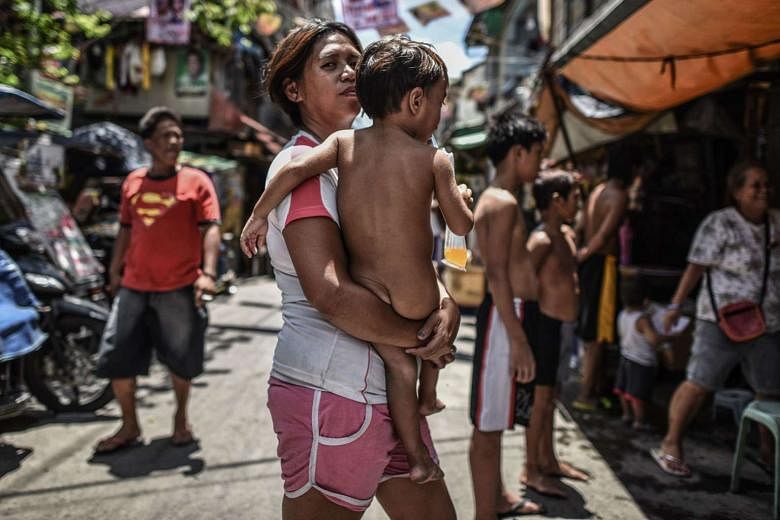MANILA • It was almost midnight and President Rodrigo Duterte was in full flight at a news conference as he singled out a married TV reporter and told her: "You're again trying to catch my attention, aren't you?" Then, as she was asking him a question, he catcalled and tried a brief serenade. Most in the room laughed.
The morning after, few remembered what the reporter had asked, or what was said during the presser, which had aired on national TV. Most recalled the long, high-pitched wolf-whistle, and the subtle act of misogyny that triggered a heated debate on sexual harassment and gender parity.
On the surface, the Philippines seems like an enviable place for women. It has been among the world's most gender-fair countries since 2006, ranking ninth in a World Economic Forum survey in 2014 based on women's participation in the economy, education, health and politics.
A female politician, Mrs Leni Robredo, was sworn in on Thursday as the country's new Vice-President. Before her, the Philippines had two female presidents, and several women run billion-dollar companies, either inheriting them or rising from the ranks. There has never been more women legislators than in the current Congress.
ECONOMIC OPPORTUNITIES
Beneath the surface, however, a different reality emerges.
"The overall ninth-place ranking needs to be interpreted with caution," said Ms Fiona McPhail, a professor at the University of Northern British Columbia. "The construction of the gender gap index masks underperformance in the economic and political spheres where many women are still excluded," she wrote in a report for the East Asia Forum last year.

Representative Liza Maza, of the women's group Gabriela, told The Straits Times: "We need to look at the indicators. Yes, we are ahead in terms of laws passed, and women's movements have done a lot to push women's rights… But one reason we think gender parity is not real is the fact that many women are still mired in poverty. Poverty still discriminates against women.
"We are not creating enough economic opportunities for women, which makes discriminatory practices easier," she said.
For every female chief executive running a network of banks, there are millions of women toiling in factories, doing low-skilled labour without job security, she said, and there are reminders everywhere that they are less valued than men.
Only half the population of working-age women in the Philippines are in the labour force, compared with 80 per cent for men. Of the 14 million women employed, only half are salary workers. The rest are either self-employed or working in a family business or farm.
Also, hiring still favours men - three to two - and women often have to go through hoops that men do not. In job ads, for instance, companies usually look for women with a "pleasing personality".
"What does a 'pleasing personality' mean? Pretty, young, single, which is not a requirement for men. That is very discrimina- tory," said Ms Maza.
PAY DISPARITY
A saleswoman at one of the Philippines' biggest shopping malls who asked not to be named, said she is reminded she is a woman from the moment she arrives for work at 9am.
"The first thing I do is... put on my stockings, heeled shoes and make-up. All are required for women. The men don't have to, of course," the 27-year-old said.

Then, before she goes to her assigned area, she is frisked. Sometimes, she is asked to lift her skirt. Women are not supposed to wear shorts, half-slips or girdles.
Then she starts working - smiling at strangers, being ogled by men, young and old, and standing for eight hours or more.
The discrimination becomes even more palpable on pay day. She said she gets about 18,000 pesos (S$516) a month - about 20 per cent less than her male colleagues. "I wish things can be better, but I am just thankful I have a steady job," she said.
Ms Joms Salvador, secretary- general of Gabriela, said the disparity is more glaring on farm lands. "Back there, women make 10 centavos for every peso a man makes," she said. One peso is equivalent to 100 centavos.
WOMEN AS 'PLACEHOLDERS'
Ms Maza said the Philippines' high gender parity ranking followed a surge in the number of "women in authority". In the May 9 elections, Ms Leni Robredo, 52, was elected Vice-President. There are six female senators and 86 women in the House of Representatives.
"The reality, however, is that women exercise less power than those numbers indicate," said the Carter Centre, a US-based non-government think-tank.
In an election post-mortem released last month, it said because politics in the Philippines was a "family affair" - clans rule 73 of the nation's 80 provinces - women in politics are often seen as mere "place-holders".
"When spouses, brothers or other male relatives reach term limits, the male incumbents step aside for a term, to return as soon as the term has passed," the group said.
Even when women are in charge, it added, "there is sometimes a public perception that, in fact, the male relative is exercising effective power and control".
Said Ms Maza: "Our experience with having two female presidents points clearly to the fact that having women in positions of power is not enough. They both came from the elite, and their interests were not the interests of poor women. That is not the kind of vision we have. What we need are women in authority who are not just pro-women in substance, but pro-poor women."
VIOLENCE AT HOME
But it goes beyond the workplace.
In public and at home, many women still suffer discrimination, which can sometimes be severe.
According to the 2013 National Demographic and Health Survey, a woman falls victim to domestic violence every 16 minutes. A woman is raped every 53 minutes.
Police records show that the number of rape cases nearly doubled from 5,132 in 2010 to 9,875 in 2014. Violations of Republic Act 9262, which include spousal abuse, child prostitution, threats and concubinage, spiked from some 10,000 in 2010 to more than 31,900 in 2014.
These numbers are far below what is actually happening on the ground, said Gabriela's Ms Salvador. She said only one in three women actually reports cases of spousal abuse, rape, incest or sexual harassment, and most cases are dropped.
Gabriela has yet to win a case involving women it is helping.
"Many women, rather than relive what happened to them when they report, just keep quiet. Many also think domestic violence is part of any relationship, so they don't report," said Ms Salvador.
Poverty also traps them, she said.
"Many women can't get out from a situation of violence because they don't have the economic means to exist or subsist on their own. They still need their abusive husbands economically. If they have jobs, or an income, the decision to escape an abusive relationship will be easier," said Ms Salvador.
LAW ENFORCEMENT PROBLEMS
Ms Maza, the lawmaker, said the Philippines has enough laws to protect women but enforcing them is the problem.
She said more effort is needed than just setting up women's desks at police precincts.
"Those enforcing them are not yet gender-sensitive… It's in our culture - machismo - which is difficult to change. We need to educate, train those in the grassroots, and make them realise that violence against women is a crime, not a petty squabble that can be resolved by mediation," she said.
"One in five cases of violence against women is unacceptable. It has to be zero violence."



